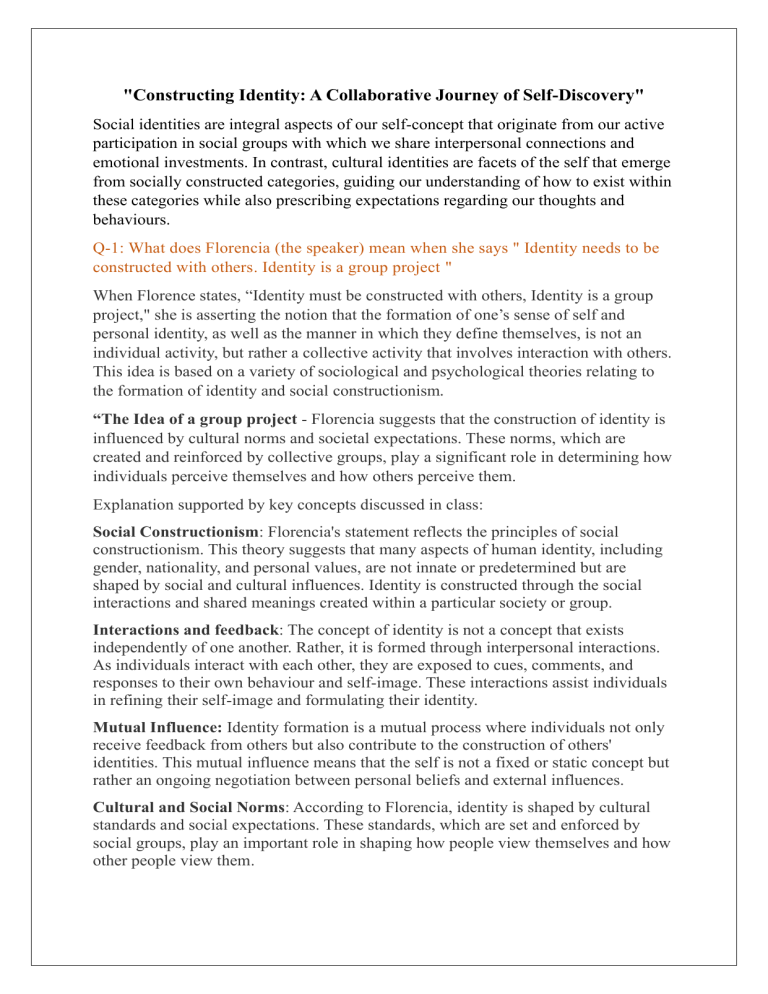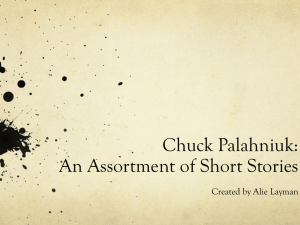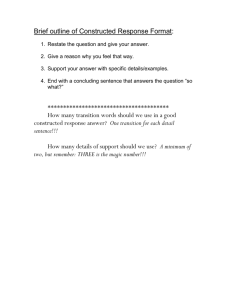
"Constructing Identity: A Collaborative Journey of Self-Discovery" Social identities are integral aspects of our self-concept that originate from our active participation in social groups with which we share interpersonal connections and emotional investments. In contrast, cultural identities are facets of the self that emerge from socially constructed categories, guiding our understanding of how to exist within these categories while also prescribing expectations regarding our thoughts and behaviours. Q-1: What does Florencia (the speaker) mean when she says " Identity needs to be constructed with others. Identity is a group project " When Florence states, “Identity must be constructed with others, Identity is a group project," she is asserting the notion that the formation of one’s sense of self and personal identity, as well as the manner in which they define themselves, is not an individual activity, but rather a collective activity that involves interaction with others. This idea is based on a variety of sociological and psychological theories relating to the formation of identity and social constructionism. “The Idea of a group project - Florencia suggests that the construction of identity is influenced by cultural norms and societal expectations. These norms, which are created and reinforced by collective groups, play a significant role in determining how individuals perceive themselves and how others perceive them. Explanation supported by key concepts discussed in class: Social Constructionism: Florencia's statement reflects the principles of social constructionism. This theory suggests that many aspects of human identity, including gender, nationality, and personal values, are not innate or predetermined but are shaped by social and cultural influences. Identity is constructed through the social interactions and shared meanings created within a particular society or group. Interactions and feedback: The concept of identity is not a concept that exists independently of one another. Rather, it is formed through interpersonal interactions. As individuals interact with each other, they are exposed to cues, comments, and responses to their own behaviour and self-image. These interactions assist individuals in refining their self-image and formulating their identity. Mutual Influence: Identity formation is a mutual process where individuals not only receive feedback from others but also contribute to the construction of others' identities. This mutual influence means that the self is not a fixed or static concept but rather an ongoing negotiation between personal beliefs and external influences. Cultural and Social Norms: According to Florencia, identity is shaped by cultural standards and social expectations. These standards, which are set and enforced by social groups, play an important role in shaping how people view themselves and how other people view them. Q-2: In the video Florencia quotes Chuck Palahniuk - "Nothing of me is original. I am the combined effort of everyone I have ever known ". Chuck Palahniuk's quote, "Nothing of me is original. I am the combined effort of everyone I have ever known," has profound implications for understanding social identity and the construction of one's sense of self. This statement highlights several key concepts in the context of social identity. In the context of Florencia's work, she elaborates on the formation of her identity, which has developed over time as she has lived in various countries and encountered different cultures. Her experiences illustrate the notion that identity is not static and monolithic, but rather dynamic and formed by a multiplicity of influences. The quote by Chuck Palahniuk refers to the fact that our social identity is a representation of our social relationships and interactions, thus demonstrating the interdependent nature of social identity. Chuck Palahniuk’s quote highlights the following key concepts in the context of social identity: Socially Constructed Identity: Our identities are shaped by social interactions and influences, not predetermined. Interconnectedness: We are a mosaic of traits absorbed from others, underlining the importance of relationships in forming our identities. Influence of Others: Others significantly impact our beliefs, behaviours, and selfconcept. Multifaceted Identity: Identity is not singular but varies in different contexts and with different people. Ongoing Self-Development: Identity evolves with new experiences and interactions, reflecting our collective life journey.

